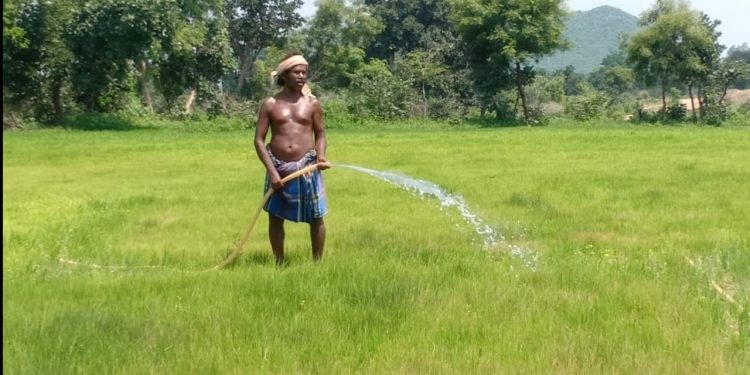Kesinga: Due to rains playing truant, the farmers in Kesinga block of Kalahandi district are staring at one more year of seedling death (Gaja Marudi) situation. They have been facing this problem for the last six years in a row. Farmers spraying water on seedlings is a common sight in Kesinga block these days. They are trying their best to save the seedlings at least till the next spell of rainfall.
Kesinga’s share of rainfall in June has been between 71.8mm and 84.6mm as against the normal of 150 mm to 200mm for the last six years. This is the main reason why paddy cultivation has suffered in this part of the district. According to the Central Water Commission, Kesinga branch, the block received only 78.4mm rain between July 1 and 19.
The 26 gram panchayats in Kesinga block have approximately 30,000 hectares of cultivable land. By June-end, paddy transplantation would have been completed in 9,000 hectares. However, transplantation has so far been done in only 5,000 hectares.
One of the main reasons why agricultural activities get delayed in some parts of the block is due to the type of soil. The panchayats of Balsi, Paralsinga, Kandel, Shirol, Tundla, Belkhandi, Turlakhaman have a soil type called as ‘Balia Dorasa’ by the locals. Without adequate rainwater it is difficult to plough this variety of soil. So agriculture activities suffer due to lack of rain.
Similarly, by June end, cotton cultivation should have been completed in 10,000 hectares. But till mid-July, it has been done in only 6,000 hectares. While maize cultivation has been carried out in 105 hectares, sowing of groundnut and pulse crops is yet to start.
What has added to the farmers’ woes is that they are having problem in acquiring seeds. They alleged that the Agriculture department is not providing sufficient quantity of seeds.
When contacted, assistant agriculture officer, Kesinga, Janaki Ballav Pattanayak admitted that the cultivation work has got delayed due to scanty rainfall. When asked about seeds, he said steps are being taken to provide seeds to the farmers as soon as possible.
PNN







































